Carl E. Olson's Blog, page 171
January 24, 2013
Cardinal Stafford on the 1960s, Roe v Wade: "I weep for America"
Cardinal J. Francis Stafford, a former archbishop of Denver and former head of two Vatican offices, was recently interviewed by Francis X. Rocca of Catholic News Service:
[Cardinal Stafford] said that the legalization of abortion was itself a result of flawed ideas about freedom deeply rooted in American history.
Cardinal Stafford, 80, spoke with Catholic News Service shortly before the Jan. 25 March for Life marking the 40th anniversary of Roe v. Wade, the 1973 U.S. Supreme Court decision that lifted most legal restrictions on abortion.
He said that Roe was one of a series of cultural, social, political and legal upheavals during the 1960s and early 1970s that left him deeply disillusioned with his native land and alienated from a country that he said once offered unparalleled openness to the proclamation of the Gospel.
"I don't really feel as at home now in the United States as I did prior to the 60s," he said.
Here is video of some of the interview:
January 23, 2013
Celebrating the feasts of St. Thomas Aquinas and St. John Bosco

Celebrating the feasts of St. Thomas Aquinas and St. John Bosco.
Offer ends Tuesday January 29th, 2013 at 12:00 midnight EST. These prices are available online only through Ignatius.com
St. Thomas Aquinas, O.P., was an Italian Catholic priest in the
Dominican Order, a brilliant writer, teacher of philosophy and sacred
theology. St. John Bosco, also an Italian Catholic priest, was an
innovative, very successful educator, who overcame a difficult
childhood, and founded a religious order, the Salesians, for helping
educate boys. Although both men led very different lives as priests,
they each possessed a great love for God, the truth, and people. And
through this love for God, they accomplished tremendous things. We
celebrate these two great saints with 20% off selected titles on their
amazing lives and work. See below!
 Roe v Wade 40 years Later, the Walk for Life West Coast, and the March for Life in DC
Roe v Wade 40 years Later, the Walk for Life West Coast, and the March for Life in DC
January 22nd
marks the 40th anniversary of Roe v. Wade and what better way to
support the Pro-Life movement by participating in the Walk for Life West
Coast or the March for Life.
For more information about the Walk for
Life click here. For information about the March for Life in Washington D.C., click here.
 Join Ignatius Press on a Saint Paul & Bible Lands Pilgrimage Cruise with Steve and Janet Ray
Join Ignatius Press on a Saint Paul & Bible Lands Pilgrimage Cruise with Steve and Janet Ray
Ignatius
Press with President Mark Brumley and Father Mark Mary invite you on a
Saint Paul & Biblical Lands Mediterranean Cruise and Pilgrimage led
by Steve and Janet Ray. For more information about this exciting two
week pilgrimage, click here.
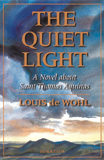 The Quiet Light
The Quiet Light
Louis de Wohl
The famous novelist de Wohl presents a stimulating historical
novel about the great St. Thomas Aquinas, set against the violent
background of the Italy of the Crusades. He tells the intriguing story
of St. Thomas who defied his illustrious, prominent family's ambition
for him to have great power in the Church by taking a vow of poverty and
joining the Dominicans. Also available as an e-book.
Regular price: $17.95, sale price: $14.36
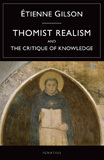 Thomist Realism and The Critique of Knowledge
Thomist Realism and The Critique of Knowledge
Etienne Gilson
The highly regarded French philosopher, Étienne Gilson,
brilliantly plumbs the depths of Thomistic Realism, and false Thomisms
as well, in this answer to Kantian modernism.The important work,
exquisitely translated by Mark Wauck, brings the essential elements of
philosophy into view as a cohesive, readily understandable, and erudite
structure, and does so rigorously in the best tradition of St. Thomas. Also available as an e-book.
Regular price: $18.95, sale price: $15.16
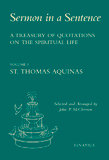 Sermon in a Sentence, Vol. 5: Thomas Aquinas
Sermon in a Sentence, Vol. 5: Thomas Aquinas
John McClernon
This is the fifth volume in this popular series of deluxe, small
hardcover books that contain a collection of hundreds of direct quotes
and short sayings of great saints, this book being from the writings of
St. Thomas Aquinas. His words are arranged and classified by the virtues
represented in the 20 decade Rosary. The Rosary mysteries—Joyful,
Luminous, Sorrowful, Glorious—provide us with a mosaic of virtues for
the spiritual life, a ladder for advancing in holiness and in love of
God and neighbor. Also available as an e-book.
Regular price: $12.95, sale price: $10.36
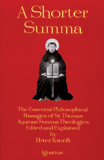 A Shorter Summa
A Shorter Summa
Peter Kreeft
A shortened version of Kreeft's much larger Summa of the Summa, which in turn was a shortened version of the Summa Theologica.The Summa
is certainly the greatest, most ambitious, most rational book of
theology ever written. In it, there is also much philosophy, which is
selected, excerpted, arranged, introduced, and explained in footnotes
here by Kreeft, a popular Thomist teacher and writer. Also available as an e-book.
Regular price: $13.95, sale price: $11.16
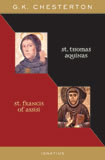 St. Thomas Aquinas and St. Francis of Assisi
St. Thomas Aquinas and St. Francis of Assisi
G. K. Chesterton
Here, together in a single volume, are the two biographies that
many critics consider both Chesterton's best, and the best short
portraits ever written of these two great saints. St. Thomas Aquinas is
enriched by the author's unique ability to see the world through the
saint's eyes, a fresh and animated view that shows us Aquinas as no
other biography has. St. Francis of Assisi is a profoundly Catholic
work, explaining and illuminating the life of St. Francis.
Regular price: $16.95, sale price: $13.56
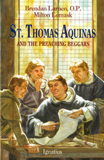 St. Thomas Aquinas and the Preaching Beggars
St. Thomas Aquinas and the Preaching Beggars
Brendan Larnen, Milton Lomask
In this 26th volume of the acclaimed Vision Books series of saints
lives, children from ages 9 to 15 will enjoy the exciting story of the
man who wrote the masterful Summa Theologica, the advisor to popes who refused ecclesiastical honor, the simple friar who shook the medieval world with his intellect.
Regular price: $9.95, sale price: $7.96
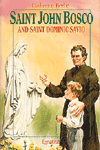 Saint John Bosco
Saint John Bosco
Catherine Beebe
A Vision book containing the enthralling story of the great modern
apostle of youth, Saint John Bosco, and his best-loved pupil who became a
saint, Dominic Savio. Blessed with tremendous natural and supernatural
gifts, including a wonderful sense of humor, Saint John Bosco overcame
overwhelming obstacles to help deprived children find a better life.
Regular price: $9.95, sale price: $7.96
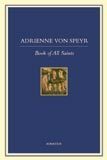 Book of All Saints
Book of All Saints
Adrienne von Speyr
In this powerful spiritual work, the reader is able to participate
in the devotional and spiritual life of the Church throughout the
centuries by learning how numerous saints and devout people prayed
including St. Thomas Aquinas, St. Ignatius of Loyola, St. Teresa of
Avila, St. John of the Cross, St. John Bosco, St. Bernadette, and many,
many more. Also available as an e-book.
Regular price: $24.95, sale price: $19.96
Summa of the Summa
Peter Kreeft
This unique book combines selected essential philosophical passages from Thomas' Summa
with footnotes and explanations by Kreeft, a popular Thomist teacher
and writer. Kreeft selected those passages from Thomas that are
intrinsically important, non-technical enough to be intelligible to
modern readers, and most likely to be used in a class or by independent
readers who want to study the Summa on their own. Also available as an e-book.
Regular price: $29.95, sale price: $23.96
Guide to Thomas Aquinas
Josef Pieper
One of the great philosophers of the 20th Century, Josef Pieper,
gives a penetrating introduction and guide to the life and works of
perhaps the greatest philosopher ever, St. Thomas Aquinas. Pieper
provides a biography of Aquinas, an overview of the 13th century he
lived in, and a wonderful synthesis of his vast writings. Also available as an e-book.
Regular price: $16.95, sale price: $13.56
Summa Theologica
St. Thomas Aquinas
The Summa Theologica is a summing up of all that can be
known about God and man's relations with God. It consists of 38 tracts,
631 questions, about 3000 articles, 10,000 objections and their answers.
This edition translated by the English Dominican Fathers contains the
complete text, the supplements, a chart showing the structure of the
work, and an analytical index.
Regular price: $165.00, sale price: $132.00
John Paul II & St. Thomas Aquinas
Pope John Paul II's writings display the contemporary relevance of
the truths set forth by Aquinas in the thirteenth century, particularly
Aquinas's appreciation of the biblical revelation and the patristic
witnesses, well as keen metaphysical penetration. In JP II's creative
mind, the key insights of Aquinas are extended and developed.
Regular price: $24.95, sale price: $19.96
On Hope
Josef Pieper
This is a masterpiece on a forgotten virtue by one of the great
Christian philosophers of the twentieth century. Pieper applies the
perennial wisdom of Thomas Aquinas to the needs of the present day.
Pieper illuminates the entire Christian life through the virtue of hope.
Also available as an e-book.
Regular price: $9.95, sale price: $7.96
The Human Wisdom of St. Thomas
Josef Pieper
Josef Pieper has attached no commentary to the texts brought
together in this breviary of the philosophy of St. Thomas, preferring
that the reader should encounter them, "on his own". His work has been
one of selection, in which he has sought to assemble such passages as
will provide an introduction to the form and design of the whole
Thomistic system.
Regular price: $12.95, sale price: $10.36
Films
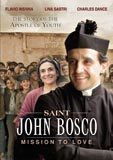 St. John Bosco
St. John Bosco
Mission to Love
Flavio Insinna gives a winning performance as John (Don) Bosco,
the great priest and educator of youth from the tough streets of Turin,
Italy. Beautifully filmed in Italy, this epic movie dramatizes the many
challenges that Don Bosco had to overcome from his childhood through
founding his religious order, the Salesians, for helping educate boys.
Growing up without a father gave him compassion for the many orphans
that he cared for, while he faced persecution from both secular society
and the Church as he fought to build a place to house and educate the
homeless, outcast youth of Turin
Regular price: $24.95, sale price: $19.96
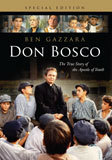 Don Bosco
Don Bosco
The True Story of the Apostle of Youth
Don Bosco is the inspiring true story of a brave and holy priest
whose single-handed battle to save the children of the streets inspired
the formation of the Salesians , which is now a worldwide religious
order that carries on his work with youth everywhere. Blessed with
tremendous gifts, a creative imagination and a great sense of humor,
Bosco had a winning way with youth and was a brilliant educator.
Regular price: $24.95, sale price: $19.96
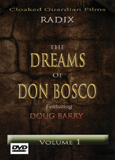 The Dreams of Don Bosco
The Dreams of Don Bosco
St. John Bosco was born and lived in Italy during the 19th
century. Known as Father, or Don Bosco, his mission in life was to save
young souls from destruction and give them a new life. His work began
with the founding of the Oratory, a school for young boys. It was about
his work with these boys that Don Bosco had numerous supernatural
dreams. Now you can learn about these dreams in action through the
powerful storytelling of Doug Barry.
Regular price: $14.95, sale price: $11.96
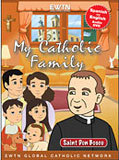 Saint Don Bosco
Saint Don Bosco
My Catholic Family
Thomas and his wife Helen guide their children Alex and Sarah in
the ways of holiness by teaching them about the lives of the saints. In
this episode, explore the life and spirituality of one of the great
apostles of the youth, St. Don Bosco.
Regular price: $14.95, sale price: $11.96
Catholic World Report
Liberty and Justice for All: Roe v. Wade's Betrayal
by Jim Graves
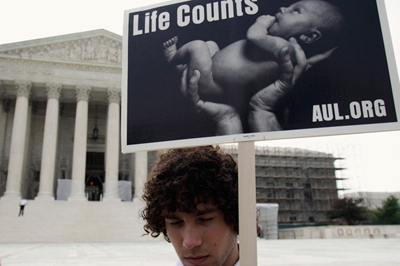
Robert P. George on Roe's cultural and legal legacy, 40 years and 50 million lives later
Robert P. George, 57, a Roman Catholic and a professor of jurisprudence
at Princeton University, has long been a respected intellectual and
defender of natural law. He served on the drafting committee of the 2009
Manhattan Declaration, which defended the sanctity of human life,
traditional marriage, and religious liberty, and was signed by more than
150 prominent Christian leaders. He has been outspoken in defense of
the unborn and traditional marriage, and has influenced many well-known
political leaders. The New York Times has dubbed him “the
reigning brain of the Christian right”; Archbishop of Newark John Myers
describes him as “the pre-eminent Catholic intellectual.”
In a recent interview with CWR, he shared his thoughts on the
infamous Roe v. Wade decision, which struck down the nation’s abortion
laws. The 40th anniversary of the decision is January 22, 2013.
Homiletic & Pastoral Review
Are doctrine and morals too controversial?
Fr. Kenneth Baker, S.J.
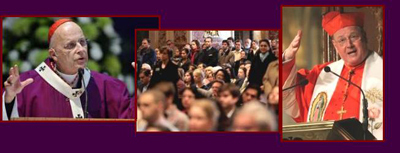
What happens to a parish, and to its parishioners, when the
pastor refuses to preach Catholic doctrine and morals on the grounds
that they are now "too controversial"?
"I don't preach on doctrine and morals anymore because they are too
controversial." Those are the exact words of the pastor of a New Jersey
Catholic church, which were quoted to me recently by a priest-friend who
heard them with his own ears. If the good pastor no longer "dares" to
preach about doctrine and morals, we may wonder what he does preach
about. Apparently, he prefers to preach about subjects that are not so
controversial. "Such as…?" you might respond. Well, I suppose he could
urge his parishioners to pray, to read the Bible, to practice Christian
charity by helping the needy. But even these subjects today are not
without their controversial aspects.
For Additional Sale Items Click HERE!
Items are not sold on approval.
Periodically we make available -- only to you, our valued repeat
customers -- special offers which are not available to the general
public. We offer these discounted prices as our gift to those who help
us by using Ignatius.com. Please do not ask for retroactive price
consideration. We cannot accommodate those requests. Many thanks.
The Church and Modernity

The Church
and Modernity |
Chilton
Williamson, Jr. | Catholic World Report
It is an
uneasy relationship, especially since many aspects of the “modern age” run
counter to Christian thinking and living.
The great sin of
journalists is in their reducing everything under the sun to a subject suitable
to mere journalism. Their coverage of the national debate over which
reproductive mechanisms and procedures conscientiously objecting institutions
ought to be made to pay for under the new national health care plan is a
conspicuous example of their presumptive shallowness.
The journalistic
treatment of the controversy opposes an ancient reactionary institution (the
Church of Rome), retrograde in its moral teaching (in particular where human
sexuality is concerned), with a postmodern world in urgent need of an updated
moral system in conformance with our enlightened times. The formulation
reflects the starkly simplistic terms in which journalists view the world,
allowing them to present current events and the history from which they issue
as a morality play cut free from a fixed moral code.
Pull it inside
out, however, and you have quite a different proposition to deal with, this one
on the metaphysical rather than the political level and as such entirely
unsuitable to journalism and the journalistic mind. The revised formulation
goes as follows. An upstart, materialist, shallow, ignorant, willful, and
willfully misinformed age has thrown down the gauntlet at the feet of an
Institution founded two millennia ago by God Himself, Who has been infusing it
with divine Grace and understanding ever since. If Church teachings no longer
correspond with the social conditions of our Brave New World, then we need to
compare the circumstances of the building Utopia with those of traditional
Christian societies (the sniveling Old World) in previous ages to enable us to
see where and how the new world is wanting. It is for the modern age, in other
words, to be judged by the Church, not the Church by the modern age.
Continue reading on the CWR site.
Related articles
 Shaky, Not Stirring
Shaky, Not Stirring On Writing a History of the Catholic Church
On Writing a History of the Catholic Church The Church, Nonprofits, and Taxes
The Church, Nonprofits, and Taxes New: "Modern Moral Problems: Trustworthy Answers to Your Tough Questions"
New: "Modern Moral Problems: Trustworthy Answers to Your Tough Questions"
January 22, 2013
Peter Kreeft on what to do about abortion

Introduction to Three
Approaches to Abortion: A Thoughtful and Compassionate Guide to Today’s Most Controversial
Issue | Peter Kreeft
Abortion is the single most divisive public issue of our time, as slavery
was for the nineteenth century, or as prohibition was for the 1920S. Intelligent,
committed pro-lifers will not be satisfied in principle with anything less
than the legal prohibition, or abolition, of all abortion (though most pro-lifers
are pragmatic enough to accept partial abolitions as incremental steps toward
that goal). And intelligent, committed pro-choicers understand this and
resist, also in principle, any of these incremental steps. Pro-lifers find
it intolerable that the most innocent and vulnerable members of our society
and our species are legally slaughtered. Pro-choicers find it intolerable
that women be forced by law to bear unwanted children against their will.
Neither side can or will budge, in principle.
There are only four things that can possibly be done in such a situation.
First, we could simply accept the current standoff and hope it will not
erupt into violence and civil war, as abolitionism did in the nineteenth
century. Perhaps if we do nothing the problem will just go away. Obviously
this is naive and irresponsible. It is also unhistorical. Already in the
U.S. and Canada some have appeared who have murdered abortionists or even
their office workers. They have already done what John Brown did at Harper's
Ferry just before the Civil War: to protest violence, they have used violence.
There is no reason to think that their ilk will simply disappear, or even
diminish.
Second, we could accept the current standoff and put social protections
around the dispute to keep it from erupting into war. What these protections
are, is not clear. No society has yet solved the problem of assassination
by fanatics, especially if the fanatics are willing to die along with their
victim for the sake of their cause. The closest any society has come to
preventing assassinations is totalitarian dictatorship. There were almost
no private assassinations under Stalin, Hitler, Mao, Castro, or Pol Pot;
all assassinations were carried out by the government- Hardly a "solution"!
Third, we could hope that one of the two sides will simply go away, or weaken,
or give up, or at least quiet down—not out of conviction but simply
because of attrition: time, not logic, will solve the problem. I fear this
is also wishful thinking, living in denial, and failing to understand the
depth of conviction of both sides.
Fourth, we could hope that reason rather than force will convince one side
it is wrong. This sounds to many people even more idealistic and unrealistic
than the first three options; but it has happened before. Many practices--including
both slavery and prohibition, as well as torture, cannibalism, blood vengeance
by families, polygamy, and infanticide—have disappeared because humanity
became convinced that these were wrong.
It is my hope that this book will help to make a little progress in this
direction, the direction of peace not through force but through enlightenment-that
is, through truth. Any other peace is perilous, for a peace not based on
truth is not true peace. Certainly, any peace based on ignoring truth, scorning
truth, indifference to truth, or disbelief in truth cannot be true peace.
Read
Review ofThree Approaches to Abortion | Peter
Kreeft's Author Page
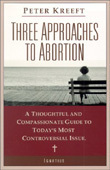
Three Approaches to Abortion: A Thoughtful and Compassionate Guide to Today's Most Controversial Issue
by Peter Kreeft
The popular author and professor, Peter Kreeft, tackles the most controversial
issue of our times in his always unique and compassionate style. He presents
approaches to the abortion issue from a logical, psychological and dialogical
explanation of the pro-life position. Kreeft hopes that clear reason,
rather than force, will help convince people of the truth of abortion
and the need to protect innocent human life. He presents the objective
logical arguments against abortion, the subjective, personal motives of
the pro-life movement, and how these two factors influence the dialog
between the two sides of the abortion issue.
“What is left to be said about the abortion debate? First of all,
that is it usually not much of a debate. Peter Kreeft points the way to
taking deepest disagreements seriously in creating and sustaining honest
debate.”
—Rev. Richard J. Neuhaus, Editor, First Things
“We all condemn the atrocities of September 11. Yet many Americans
support legalized abortion, in which we execute every day more innocent
human beings than were killed in the World Trade Center. Peter Kreeft,
with his rare talent for explaining the obvious without patronizing or
pretense, offers here a unique guide for inviting sincere persons to consider
a basic truth – that the law can never validly tolerate the execution
of the innocent.”
—Charles E. Rice, University of Notre Dame Law School
“Peter Kreeft’s book argues for the humanity of unborn human
beings and their right not to be destroyed. Kreeft practices philosophy
the way a skilled brain surgeon practices his own art, i.e., with care,
caution, courage, cunning, capability, and conviction.”
—Donald De Marco, Author, The Heart of Virtue
Peter Kreeft , a
Professor of Philosophy at Boston College, is one of the most widely read
Christian authors of our time. His more than 25 best-selling books include
Back to Virtue, Love is Stronger than Death, Catholic Christianity,
Prayer for Beginners and A Summa of the Summa.
“Liberty and Justice for All”: Roe v. Wade’s Betrayal

“Liberty and Justice for All”: Roe v. Wade’s Betrayal | Jim Graves | Catholic World Report
Robert P. George on Roe’s cultural and legal legacy, 40 years and 50 million lives later
Robert P. George, 57, a Roman
Catholic and a professor of jurisprudence at Princeton University, has long
been a respected intellectual and defender of natural law. He
served on the drafting committee of the 2009 Manhattan Declaration, which
defended the sanctity of human life, traditional marriage, and religious
liberty, and was signed by more than 150 prominent Christian leaders. He has
been outspoken in defense of the unborn and traditional marriage, and has
influenced many well-known political leaders. The New York Times has dubbed him “the reigning brain of the Christian
right”; Archbishop of Newark John Myers describes him as “the pre-eminent
Catholic intellectual.”
In a recent interview with CWR, he shared his thoughts on the
infamous Roe v. Wade decision, which
struck down the nation’s abortion laws. The 40th anniversary of the decision is
January 22, 2013.
CWR: As we mark the 40th anniversary of Roe, what is your opinion of the
decision and how firmly entrenched is it in the legal community’s thinking?
George: Roe has never been accepted by the
American people as a whole as a valid constitutional decision. It is
widely regarded, even among liberal academics, as poorly reasoned—at best. Many
scholars and others (including more than a few who are not pro-life in their
moral and political convictions) regard it as a glaring (and even embarrassing)
example of the judicial usurpation of authority left by the Constitution in the
hands of the people and their elected representatives. Even Roe’s diehard supporters tend to defend
it on the grounds that it is an “established precedent,” not on the grounds
that it is correct as a matter of constitutional interpretation.
CWR: Do you think there is a possibility of
overturning Roe and sending the
abortion issue back to the states?
George: Yes, but it
will entirely depend on the election of a Republican president in 2016. President
Obama’s appointees, present and future, will vote to uphold Roe. They will not have very good
arguments for doing so, but they will do it. I believe that currently four
justices on the Supreme Court would overturn Roe if given the opportunity. If none of these justices retires or
dies during the second Obama term, and if the next president is a Republican
who nominates a faithful constitutionalist judge to replace one of the current
pro-Roe justices, then Roe would finally go the way of Plessy v. Ferguson [the 1896 US Supreme
Court decision that upheld state laws requiring racial segregation in public
facilities; it established the so-called “separate but equal” principle] and other shameful decisions that blot
the Supreme Court’s historical record.
CWR: In the years since you began publicly
supporting the pro-life cause, how has the debate over abortion changed?
Continue reading at www.CatholicWorldReport.com.
Related articles
 Contraception in the United States: A Short History
Contraception in the United States: A Short History Card. O'Malley calls for prayer, penance on 40th anniversary of Roe v. Wade
Card. O'Malley calls for prayer, penance on 40th anniversary of Roe v. Wade Preparing for a Fortnight for Freedom: A Short History Lesson
Preparing for a Fortnight for Freedom: A Short History Lesson
January 21, 2013
On the Pope’s recent essay in the London "Financial Times"
“Christians render to Caesar only what belongs to
Caesar, not what belongs to God.”
I.
On
December 20, at their request, the Editors of the London Financial Times published a column by
Benedict XVI. In
the L’Osservatore Romano reprint (January 3, 2013), it was entitled “Christians
Without Compromise.” At the end of the column, the Financial Times’ editors amusingly, in
my view, succinctly identify the author as “The Bishop of Rome and author of Jesus
of Nazareth: The Infancy Narratives.” Obviously, the title “Bishop of Rome” is
accurate. But it is also in conformity with Anglican theology, which does not
recognize the Primacy Office of Peter continuing in the present Pope.
The Pope
began his comments by citing what is certainly the most famous and
consequential passage in the New Testament about politics, namely, the “Render
to Caesar what belongs to Caesar and to God what belongs to God” (see Mt
22:15-22). Benedict immediately pointed out that this response had to do with
the legitimacy of paying taxes. It was asked to “trap” Jesus. The Pharisees
wanted to draw Christ into current politics by presenting Him with a dilemma.
If He was the awaited Messiah, surely He would oppose Roman occupation of
Palestine. Thus He was “either a threat to the regime or a fraud.”
Jesus’
response avoided the trap. At the same time, He raised the level of discourse
for both the Romans and the Jews. Implicitly, Jesus warned about the
“politicizing of religion and the deification of the state.” Both politics and
religion have a proper place. They need not be enemies except when either
politicization or deification occurs. The Jews needed to recognize their
Messiah would not be a Caesar. The Romans needed to know their Caesar was not
God. Jesus did come to establish a “Kingdom.” But it would be of a “higher
order.” At His trial, He told Pilate bluntly that His Kingdom was not “of this
world.”
Next,
Benedict turns to the “Christmas stories in the New Testament.” A similar
message is found here. Jesus’s birth takes place in Bethlehem because of a
census edict of Caesar Augustus, the first emperor of the Romans. He brought
all the conquered lands into some form of higher administrative unity. Christ
is born in an obscure place in this Empire. He would open to the world a “far
greater peace” than that of the Pax Romana. The peace that Christ offers
“transcends the limitations of space and time.”
How so?
How is Jesus presented in the New Testament? He is the “heir” of King David.”
His liberation is not about armies and conquering enemies. Rather it deals with
freeing us from “sin and death
Continue reading on the CWR blog.
Related articles
 "'Jesus of Nazareth' Completed" | by Fr. James V. Schall, SJ
"'Jesus of Nazareth' Completed" | by Fr. James V. Schall, SJ Pope: "The birth of Christ challenges us to reassess...our very way of life."
Pope: "The birth of Christ challenges us to reassess...our very way of life." Benedict XVI on the "What" and "Why" of Baptism
Benedict XVI on the "What" and "Why" of Baptism The Pope's Book About Christmas
The Pope's Book About Christmas "Connecting crib and cross": On Benedict XVI's new book
"Connecting crib and cross": On Benedict XVI's new book
Lost in Translation (from Latin)?

Lost in Translation (from Latin)?
| Christopher S. Morrissey | Catholic World Report
Pope Benedict XVI sent out his first tweet in Latin today. Lessons in Latin now follow.
The Pope finally sent out his first tweet in Latin from his
Twitter account @Pontifex_ln on
Sunday, January 20, 2013: “Unitati christifidelium integre studentes quid iubet
Dominus? Orare semper, iustitiam factitare, amare probitatem, humiles Secum
ambulare.”
The Pope immediately followed it up with translations into
the languages of his other Twitter accounts. He translated the Latin via his
English language account @Pontifex this
way: “What does the Lord ask of us as we work for Christian unity? To pray
constantly, do justice, love goodness, and walk humbly with Him.”
But the news service Reuters performed a valuable service by
quoting the University of Cambridge scholar Tamer Nawar, who teased out a more
nuanced translation of the Latin: “What does the Lord command to those wholly
eager for the unity of those following Christ? To always pray, to continually
do justice, to love uprightness, to walk humbly with Him.”
True, Nawar’s translation sounds more clunky in English than
the Pope’s English tweet. But it certainly exhibits an appreciation of all the
subtlety packed into the Latin tweet. For me, it demonstrates why knowledge of
Latin is indispensable. Namely, that it can help one become attuned to
subtleties and nuances of thought that would otherwise be missed.
Perhaps my favorite part of the Pope’s inaugural Latin tweet
is his use of the verb “factitare” in relation to “justice”, since “factitare”
has the connotation of “to make or do frequently; to be wont to make or do; to
practice.”
Indeed, I’m very happy with the Pope’s first Latin tweet,
but I was in a bit of a sour mood because of the press coverage leading up to
it. That coverage had me wishing for the impossible, that the Pope’s
first Latin tweet would be a sarcastic: “ROMANES EUNT DOMUS”.
If you don’t get the joke, then Google the phrase and watch Monty Python’s famous
Latin lesson, in which a Roman soldier corrects the graffiti of an empire
rebel.
Continue reading at www.CatholicWorldReport.com.
Related articles
 "There are zingers, and then there are Denzingers..."
"There are zingers, and then there are Denzingers..." Preface to Nicola Bux's "Benedict XVI's Reform", by Vittorio Messori
Preface to Nicola Bux's "Benedict XVI's Reform", by Vittorio Messori Pope Benedict tweets in Latin for the first time but draws a blank response from many followers
Pope Benedict tweets in Latin for the first time but draws a blank response from many followers Pope posts first tweet in Latin
Pope posts first tweet in Latin Hoping to revive an ancient tongue, Pope tweets in Latin
Hoping to revive an ancient tongue, Pope tweets in Latin
January 19, 2013
Cana, Signs, and Sacraments
A Scriptural Reflection on the Readings for Sunday, January 20, 2013 | Carl E. Olson
Readings:
• Is 62:1-5
• Ps 96:1-2, 2-3, 7-8, 9-10
• 1 Cor 12:4-11
• Jn 2:1-11
The Gospel of John contains some seventeen direct references to signs (semeia), which is St. John’s term for the miraculous deeds
of Jesus. St. John is especially interested in how these various signs are
manifestations of God’s new and transforming intervention in human history
through the Word, the Logos. His
Gospel is a profound reflection on the fact and mystery that God became man and
dwelt among us, “full of grace and truth” (see Jn 1:1-14).
Chapters 2 through 12 of John’s Gospel are sometimes called
collectively “The Book of Signs,” for they contain seven signs, or miracles,
performed by Christ. These signs include the healing of the official’s son (Jn
4), the healing of the paralytic (Jn 5), the multiplication of the loaves (Jn
6), walking on water (Jn 6), the restoration of the blind man (Jn 9), and the
raising of Lazarus (Jn 11).
The first sign, however, is the miracle at the wedding at
Cana, proclaimed in today’s Gospel, which is found only in the Fourth Gospel.
The exact location of Cana is unclear, but it was probably just a few miles
north of Nazareth. The identity of the bride and groom are unknown, although a
later tradition from about the third century states
that Mary was the aunt of the bridegroom.
What is known, for it forms
the crux of the story, is that something embarrassing had taken place: the
wedding party ran out of wine. Mary, ever attentive to the needs of others,
intercedes on behalf of the bride and groom, telling her son, “They have no
wine.” She prays—that is, entreats—in faith, for the needs of those gathered
for the feast. This foreshadows her prayers, as “Mother of all the living” and
Mother of the Church, at the foot of the Cross, the saving way to the marriage
feast of the Lamb (cf. Catechism of the Catholic Church, 2618, 1335, 963).
Jesus’ response is puzzling, perhaps even perplexing: “Woman,
how does your concern affect me?” But the term “Woman” is not an insult, as
some have argued incorrectly; it is actually a formal title of respect (cf.
Matt 15:28). What is unusual is how Jesus, in speaking to his mother, uses the
term without any qualifier. It indicates a changed relationship between son and
mother (cf. Jn 19:26). Further, in using it, Jesus identifies Mary as the new
Eve, whose obedience and faith will be an essential part of the new creation
and a new family, the Church.
Jesus stated that his hour—the time of his passion, death, resurrection, and
ascension (Jn 13:1)—had not yet arrived. Mary does not question him, or
protest. Her words to the servers are words of invitation to all of us: “Do
whatever he tells you.” She trusts her son, knowing he will do what is right
and necessary. “The Mother of Christ presents herself as the spokeswoman
of her Son's will,” observed Blessed John Paul II in Redemptoris Mater, “pointing out those things which must be done so
that the salvific power of the Messiah may be manifested. At Cana, thanks to
the intercession of Mary and the obedience of the servants, Jesus begins ‘his
hour.’” (par 21).
The Church sees the miracle at Cana as a “confirmation of
the goodness of marriage” (CCC 1613). But there is also a connection to
baptism, for the jars used in the miracle were for ceremonial washings, for
ritual purification from defilement. In the waters of baptism, we are cleansed
by God’s grace and transformed by his power. Through baptism we become members
of the Church, the bride of Christ, and are invited to partake of the blood of
the bridegroom (CCC 1335).
“Now we all partake at the banquet in the church,” wrote the
sixth-century saint, Romanus Melodus, “For Christ’s blood is changed into
wine/And we drink it with holy joy/Praising the great bridegroom.”
First water, then wine; first baptism, then Eucharist. By
these sacraments, perceptible signs, we are changed, cleansed, fed—and wed.
(This "Opening the Word" column originally appeared in the January 17, 2010, edition of Our Sunday Visitor newspaper.)
Related articles
 You are Who you eat: "Let Christ be eaten..."
You are Who you eat: "Let Christ be eaten..." The Shock of the Blessed Sacrament
The Shock of the Blessed Sacrament The Food that Endures for Eternal Life
The Food that Endures for Eternal Life Doctrine, Dissent, and the Eucharist
Doctrine, Dissent, and the Eucharist
Abortion Insiders Turn Their Backs on the Industry
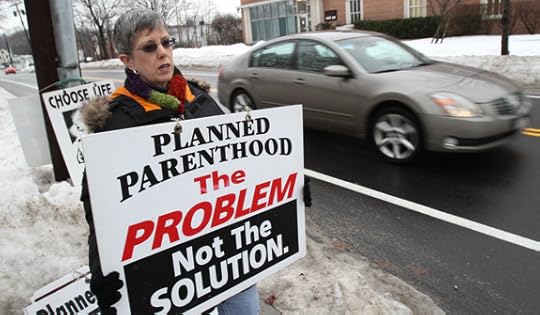
Abortion Insiders Turn Their Backs on the Industry | Jim Graves | Catholic World Report
For different reasons and in different ways, these former clinic workers have rejected abortion and embraced life.
As Americans mark the 40th anniversary of the 1973 US Supreme Court decision striking down the nation’s anti-abortion laws, Americans remain deeply divided on the issue. There is one small group, however, that has a unique perspective from which to shed light on it: former workers in the abortion industry who, for moral reasons, left their jobs—often returning to or finding religious faith—and embraced the pro-life cause. Having worked behind the doors of abortion clinics, they know first-hand what abortion is, and the destructive force it has been in many lives.
“We wouldn’t really tell them about alternative options”
Annette Lopez worked as a program assistant for Planned Parenthood in the Los Angeles area for five years. Her job was to visit high schools and teach teens about “responsible choices” relating to sex.
She first learned about Planned Parenthood while in college. A nominal Catholic, her views were rather vague on the abortion issue, and she was assured it was a small part of Planned Parenthood’s business.
Lopez initially liked her job. “I wanted to help youth,” she explained. “I had a niece who got pregnant at a very young age, and I wanted to help them avoid making her mistake.”
As Lopez was seldom at clinics she rarely saw pro-life demonstrators, and what little she knew about them was negative. Her perspective on pro-lifers came from such media depictions as the 1996 HBO movie If These Walls Could Talk, in which pro-life demonstrators are angry and violent. (Cher portrays the caring and kind abortionist, Dr. Beth Thompson, in the movie, who is harassed relentlessly by pro-lifers. At the close of the movie, she has just performed an abortion on a relieved Anne Heche, and is gunned down by a pro-lifer who bursts into the procedure room.)
In her final year at Planned Parenthood Lopez began dating her future husband, a pro-life Catholic who gently queried her about her work. “He’d ask, ‘Don’t they do abortions there? Is that right? You’re a loving person and you love your family, why are you there, where they hurt babies?’” she recalled. “He got me thinking.”
Continue reading at www.CatholicWorldReport.com.
Related articles
 New: "Modern Moral Problems: Trustworthy Answers to Your Tough Questions"
New: "Modern Moral Problems: Trustworthy Answers to Your Tough Questions" Industry of Death vs. Culture of Life
Industry of Death vs. Culture of Life Planned Parenthood, Serious About Profit, Not Women's Health
Planned Parenthood, Serious About Profit, Not Women's Health The Beginning of the End of the Abortion Industry?
The Beginning of the End of the Abortion Industry?
January 18, 2013
Card. O'Malley calls for prayer, penance on 40th anniversary of Roe v. Wade
“Our nation greatly needs our prayers and personal sacrifices,” said Cardinal Seán P. O’Malley, OFM Cap., of Boston. “The evil of abortion inflicts unimaginable pain, but Jesus offers us healing and renewal.”
The full text of Cardinal O’Malley’s statement follows:
On the 40th Anniversary of Roe v. Wade
Cardinal Seán P. O’Malley, OFM Cap.
Chairman, Committee on Pro-Life Activities
United States Conference of Catholic Bishops
January 16, 2013
January 22, 2013 marks the 40th anniversary of the tragic U.S. Supreme Court rulings Roe v. Wade and Doe v. Bolton. Without grounding in the Constitution, law or human rights, these decisions have made it legal for the past forty years in the United States to end the life of an unborn child. Since then fifty-five million children never had the chance to be born. The scope of this loss is staggering, yet the Court and many in our society relegate it to a matter of personal choice.
As part of the ongoing response to innocent children’s lives being taken with the protection of the law, the U.S. Catholic bishops have launched a major pastoral initiative calling for prayer and penance to promote and build a culture of life, marriage and religious liberty.
The initiative includes “Nine Days of Prayer, Penance and Pilgrimage” from January 19 to 27, 2013. I invite Catholics in the United States to join me in this novena. It includes daily prayer intentions for the healing and conversion of our nation, for elected officials who support abortion, and for all people whose lives have forever been changed by an abortion. The novena is available through social media, text messaging and email, to be helpful for youth and other pilgrims traveling to pro-life events and marches and for those wishing to participate from their parishes and homes.
Our nation greatly needs our prayers and personal sacrifices. The evil of abortion inflicts unimaginable pain, but Jesus offers us healing and renewal. He came not to condemn us, but to free us from the burden of the wrongs we have done so that all might be saved. His Divine Mercy knows no limits; we need only to ask his forgiveness. If you know of anyone suffering from the effects of an abortion experience, please encourage them to seek help.
It is our hope and prayer that our defense of human life and religious freedom, our witness to the dignity of each and every human person, our compassionate service and our prayers calling on the infinite love and mercy of God will spark a renewal of love and commitment to the true good of others. Only a love that seeks to serve those most in need, whatever the personal cost to ourselves, is strong enough to overcome a culture of death and build a civilization worthy of human beings created in God's image.
NOTE: For more information: On the Supreme Court’s abortion decisions: http://endroe.org
To receive daily prayers and reflections for the novena and learn how to promote them in your parish or organization: www.usccb.org/9days.
To see the help available after an abortion: http://hopeafterabortion.com.
Carl E. Olson's Blog
- Carl E. Olson's profile
- 20 followers



